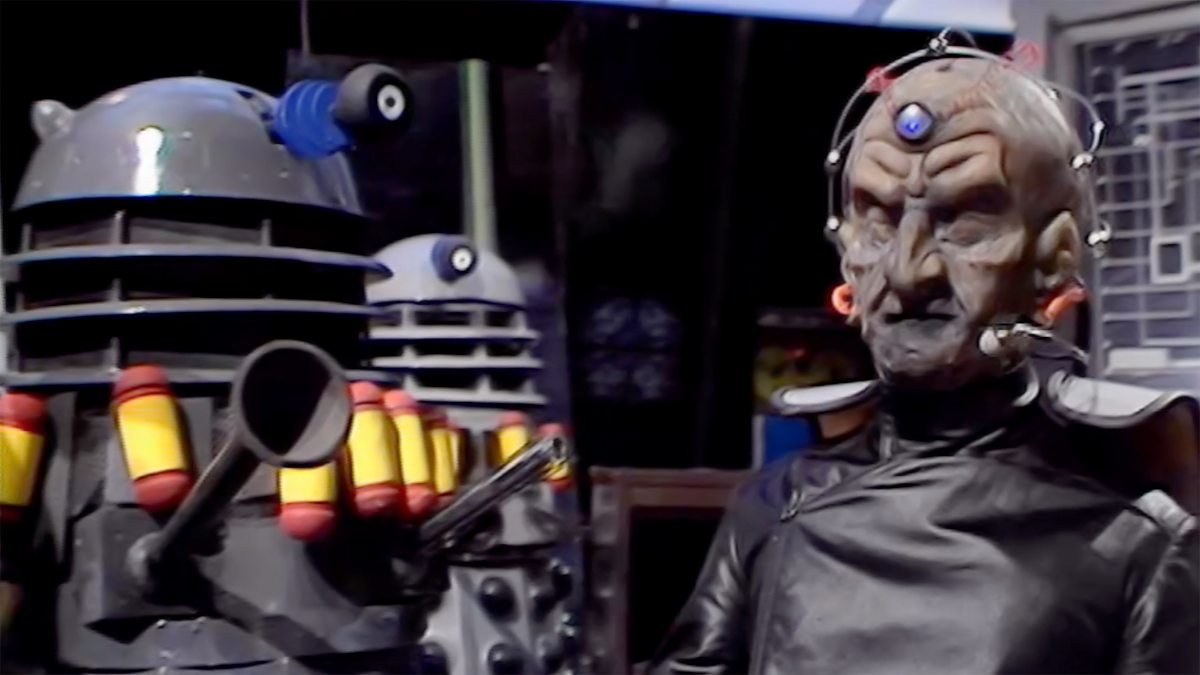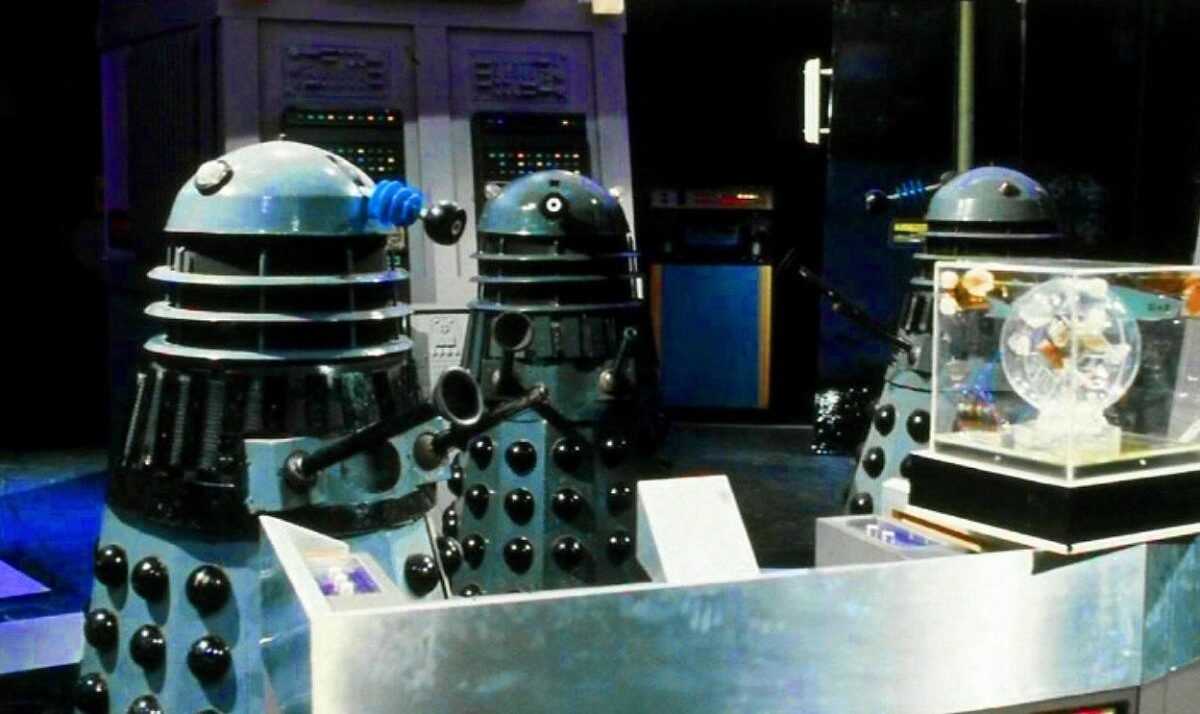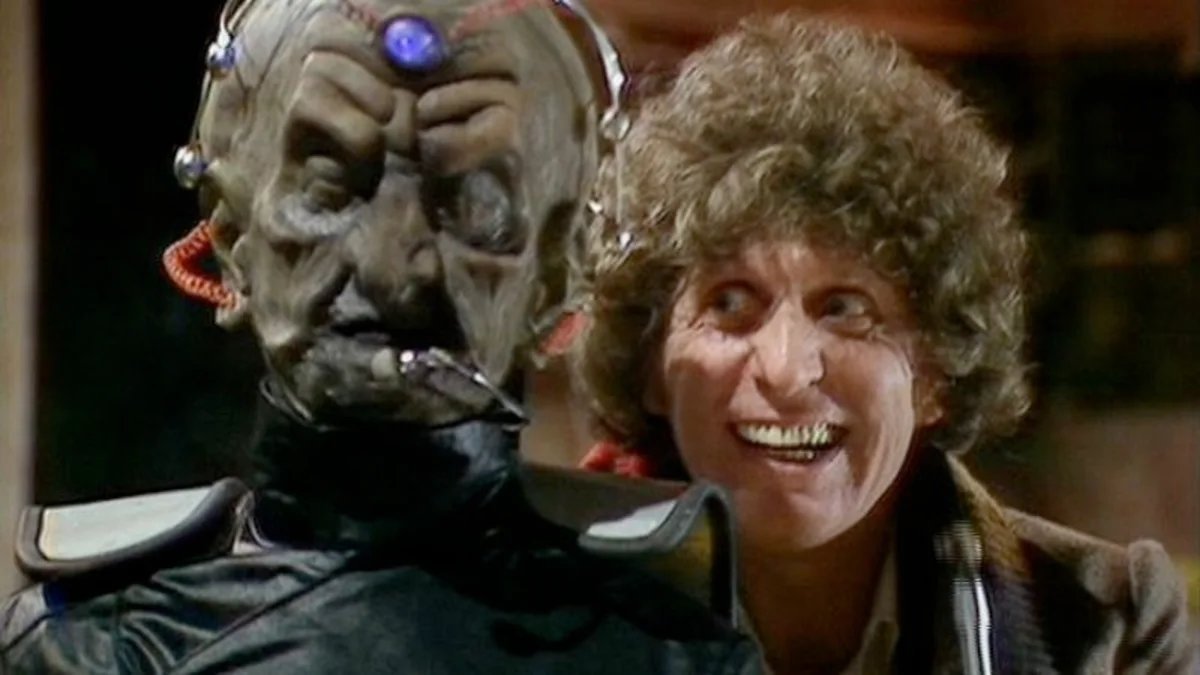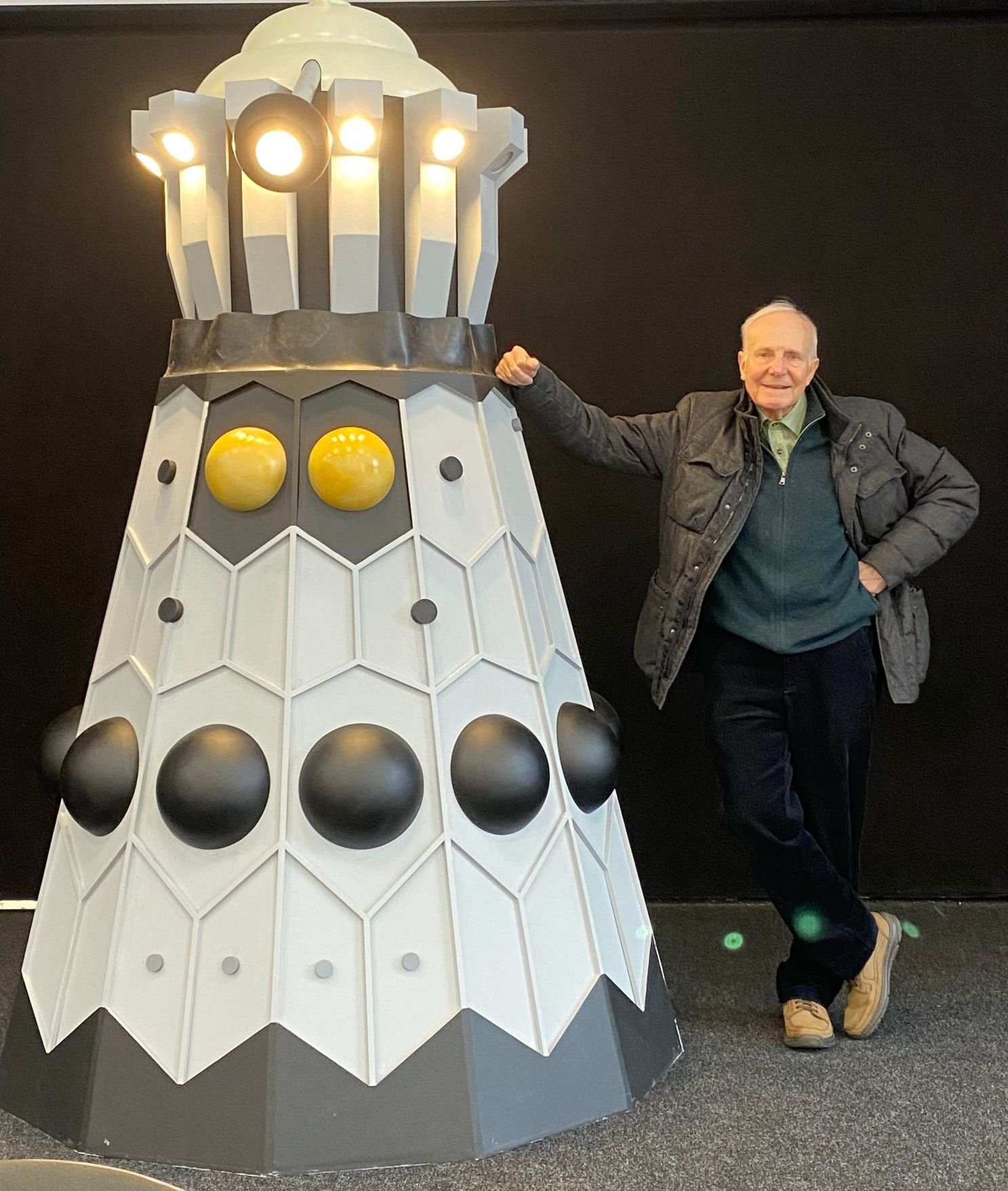Frank and Simon Danes conducted this interview in 1981, when they were just starting in the sixth form, and David Gooderson was appearing at Worthing’s Connaught Theatre in Time and the Conways. He very generously gave his time to meet two schoolboys backstage at the theatre and chat about his time in Doctor Who.
We met him again when he was a guest last year at Bedford Who Charity Con, 43 years later; he is, as you can probably pick up from the interview, a very, very nice man.
Slightly tweaked to remove teenage infelicities of style, here’s our conversation. This interview was originally published in Fendahl, 43 years ago.
You were in Destiny of the Daleks, a couple of years ago now. The first question is an obvious one: Davros was originally played by Michael Wisher, so how did the part come to you?
David: Just that my agent phoned up and said, ‘There’s a part in Doctor Who’, so it came through her, in fact, although it originally came from the producer. It had to be someone quite small, though I’m actually larger than Michael – not much, but a little bit – and the costume was a bit tight. Then I had an interview and got the job. The interesting thing was that when I took it, I didn’t realise how much of an acting part it was. I thought it was just a guy with a head-dress, you know, and you weren’t going to be seen, so that wasn’t particularly good. You also weren’t going to be heard properly because your voice was going to be put through a mixer. In fact, although the voice was treated, it was very much a character part. You had to get the weight behind Davros, the unpleasantness and the… er… megalomania [laughs].
Did you meet Michael Wisher, then?
David: No. I think he was in America. I did see tapes of his Davros, but after that I was left to do what I wanted, really.
So how much of the characterisation was your own?
David: Well, I think a fair bit. I think I had a deeper voice than Michael did; I’m not sure. The thing was, I saw the videotapes early on, and then I carried on doing my own thing. By the time I did it, I’d more or less forgotten the tapes.

It’s been said that your version of Davros was less unpleasant than the original and more sympathetic. Was this deliberate?
David: I think partially. As an actor, you see, you have the audience seeing the character from the outside, and they see what he does, and that’s what I’m doing at the moment. I’m playing a very unpleasant person, who has a reason to be unpleasant, although not as unpleasant as he is; but if you’re an actor, you sympathise with the character you’re playing. You play him from your point of view. There’s something very pathetic about Davros, this little man. As a megalomaniac, he’s not really very powerful; he thinks he’s greater than he is!
Moving on, can you tell us how a Doctor Who story is recorded?
David: It’s filmed at the BBC studios in Shepherd’s Bush and it’s rehearsed in the big new rehearsal rooms in Acton [both in London]. We have the props for rehearsals, the Dalek bases. I mean, the Daleks had half their thing – you probably know they’re in two halves – and Davros has the bottom half of it, really. We rehearsed with the Daleks going round in their buggies, and I was going round in mine.
So the Daleks didn’t have their whole thing there?
David: No. That’s why their timing is so good, because they rehearse in the open. They can see what’s going on, and one of them was particularly experienced. Cy Town – I don’t know whether you know him. He’s very experienced at things like timing the entrances. They’re quite difficult to operate, those things. Typical BBC technology! As you pedal with your feet, since they’re on castors, you have to steer with your knees. They’re really quite difficult when you have to move fast because you have to steer, you can’t look down, and you have to find a mark on the floor so you can swing into the exact position without looking. With me it was worse; you can’t see anything through that mask.
You couldn’t see at all?
David: Well, you can see. But it’s like being underwater with goggles; you can see dimly through it, and you can only see exactly what’s in front of you. You can’t see anything below or above, or to the sides. You just get that little strip.
There was a scene where the Doctor was literally pushing you around. When he was doing that, were you still pedalling?
David: No, he was pushing me. It wasn’t to give me a rest; just to make it look faster. The time I really sweated was in episode three, when the Daleks were going off to war, and I was leading them. I had to do about 40 feet of the studio, shouting at the same time, and the sweat was rolling off me.

Did you take the mask off between takes?
David: At mealtimes — you know, lunch and dinner. I had it on all the rest of the time. It was an extraordinary feeling. You had it on for four or five hours at a time, and I had to drink through a straw. I couldn’t take it off because it was stuck to my lips. And it totally encloses your head. You can’t sneeze, you can’t blow your nose, you can’t rub your eyes, and if you sweat, as I did, it just runs down your face. It is uncomfortable!
What stages did the rehearsals go through?
David: Well, as with any television play, we had what you call blocking. You work out the basic movements with lines and then you work on it. We then go into the studio; that’s where it became very exact, because you have to find your marks on the floor. There was also a certain amount of rewriting. Tom Baker has a certain freedom with the script, as he should do, but they were only minor rewrites.
What did you think of the script?
David: I thought it was very good. I think there should be more Dalek stories, really, as they’re so popular. I don’t watch a lot of Doctor Who, although I see bits of it. I don’t know how it compares with other Doctor Who scripts, but I got the feeling it was very popular.
[It was. The viewing figures were 13 million for part one; part four was watched by 14.4 million people. The repeat – it was shown again on Tuesday to Friday , 5th to 8th August 1980, averaged 6 million viewers per episode.]
In Genesis of the Daleks, Davros wanted to destroy the Daleks, terrified of what he had created. He returns and wants to become their leader, in Destiny. Any thoughts?
David: Yes, well, he’s not frightened of them any more, is he? Erm… well no, except he’s somewhat more sympathetic, and he’s a slightly more pathetic character. He’s a little inventor without a job to do, you know, and he’s created the Daleks and they’re doing very nicely, thank you. Was Tom Baker in the original?
Yes.
David: Hmm. Of course, the director was different. There was no particular concern with that sort of continuity, although obviously there’s continuity with the voice and the face.
Something else is that Davros tends to upstage the Daleks. Originally, they were their own masters, but now they have this Führer to lead them. What do you think?

David: Well… I don’t know! I think Davros adds something, as he’s half way to being a Dalek himself. In a sense, the Daleks are more powerful than him, because they’re not trying to be powerful. I can’t remember exactly how it went now, but this ‘I will be supreme!’ frustrated megalomania is another dimension to the story, I would have said.
It’s also been said that the Daleks are like the Nazis, particularly as they now have this Hitler figure to guide them. Can you read that into the script?
David: Yes, that’s certainly there. Coming back to the sympathy bit, although Hitler was a terrifying man, there was something pathetic about him. His actions, and indeed Davros’, were absolutely horrendous, there was nothing sympathetic about those, but as people they were just inadequate. I think that’s in Davros’s character.
Something else that made him more pathetic was the Doctor’s poking fun at him.
David: I think that’s the reason for the whole script. I feel that the atmosphere of Doctor Who has changed somewhat; you’ll know more about this than I do. Tom Baker is a lighter Doctor. I think the way he treated Davros – you know, ‘Poor Davros, have a jelly baby’ – undermined the power of the character.
Did you find the Dalek props difficult to act with?
David: Not really. I was one of the Dalek voices myself, actually. It’s done live, from a little room where you can see the action. Roy Skelton is an expert; he’s done it for years. In fact, I kept rushing up the stairs, to do a bit when I wasn’t involved in shooting.
Incidentally, what did you wear when you were inside Davros’ chair?
David: Trousers. That little black jacket covers it, so people can’t see them. Soft shoes. One of my arms hung down, too. The other hand had make-up on, which was really incredible. The make-up lady painted on some kind of gum, and then added the nails. When it dried, you could peel it off like a glove.
The mask looked slightly wobbly on you, actually.
David: True, but then it hadn’t actually been made for me, and it had been on exhibition. It’s not in great condition, but it’s a magnificent thing.
Is there a loudspeaker on the studio floor, so you can hear the Daleks’ lines?
David: Yes, there is. I can’t honestly remember which Daleks I did the lines for. Although I did the one when Romana was being threatened. I played them as mindless robots, with Davros half way to being one himself. They are now robots, really. I can’t remember what they were like originally, but I think they had more character.

[This aspect of the story caused a great deal of consternation among fans at the time. The Daleks in Destiny are presented as entirely robotic, with no organic features remaining.]
Can you tell us what the stages are in the studio for videotaping?
David: It’s done by sets. They’d done all the pre-filming before, in a quarry in Dorset. The studio stuff was done one set at a time.
Davros’s voice was live, wasn’t it?
David: Yes. It was also treated live, so I was wearing a throat microphone.
If you were asked to play Davros again, would you do it?
David: Oh, I think so. I very much enjoyed it. Very odd, that mask.
Do you think the Daleks have had their day, and that it’s time for them to leave the series?
David: I don’t know… I get the feeling the general public like the Daleks. Certainly, I understood the viewing figures for the Dalek stories were very good. The Daleks are the most interesting creations, apart from the Doctor himself, and I would have thought they should be kept alive. Not all the time, but I believe that, now and again, they should turn up.
Re-reading this, after all these years, David’s enthusiasm for his work in Doctor Who still comes across loud and clear. His comments about the characterisation, especially on Davros’ inadequacy as a person, are particularly interesting; his Davros is much less strident and ranting than Terry Molloy’s version, and this helps us understand why. David played Davros as an inadequate and as a ‘little inventor’ with ambitions which were beyond his capacity to realise. A pathetic figure rather than a supervillain.
David’s now in his eighties and he continues to be a popular guest at conventions. He’s warm, he always takes the time to chat to the fans, and he’s huge fun. He was brilliant in a very funny sketch at Bedford Who Charity Con 8 in 2023, where he was prosecuted for heresy by Christopher Ryan. Wendy Padbury and Frazer Hines played the judges. It’s well worth seeing.
You can also see his interview at the convention, with Christopher Ryan.
(Featured image: David with the magnificent Emperor Dalek (made by fan Connor Hart) at Bedford Who Charity Con 8.)


